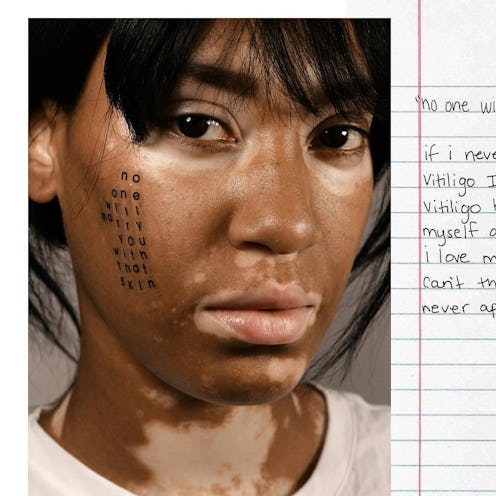Despite successful models like Winnie Harlow and the choices of some brands to normalize skin conditions in advertising, the world can be brutal to those whose differences are readily visible. Photographer Peter DeVito's portraits of people with visible skin conditions — such as albinism, alopecia, and vitiligo — are helping those who have been rudely mocked or had their appearances routinely commented about speak out against words that while some may see as innocuous questions are painful and can be damaging.
If DeVito's name sounds familiar, it's because this series isn't his first working to photograph those who live with skin conditions. According to Allure, DeVito's initial work surrounded the stigma of acne and his own self portraits. While the skin condition is common in both young adults and adults, commentary or suggestions on how to "rid" yourself of the spots, especially when unsolicited, seems to be just as common as the skin condition itself. DeVito's work acted as a means to destigmatize acne and acted against the sense of shame sometimes instilled in those who do have acne.
Now, DeVito is back with a similar portrait series that's equally as powerful. In the new round of photos, the photographer is focused on conditions such as vitiligo and alopecia, skin conditions where the effects are clearly visible on the skin. The series isn't just images that feature those with these conditions, though.
The series, of course, has eye catching portraits. But what sets DeVito's work apart is that the subject has used stickers to showcase the sometimes rude and unsolicited comments and advice they receive because of their skin.
In one image, model Bice wears, "Why are you bald?" along his cheek. Bice has alopecia, and in his response letter to DeVito calls out the tactless question writing, "The reason I'm bald has nothing to do with who I am as a person."
In portrait from the series, model Amber reveals being asked, "What's on your face?" regarding the birthmark against the side of her lips.
In her response, she appears to tackle the misconceptions that her mark makes her weak or ugly. Instead, she writes that it does the opposite, making her strong, confident, and beautiful.
Albinism is also explored in the series. Model Diandra Forest opens up for the series about her albinism explaining that she had multiple nicknames growing up that centered around the lightness of her skin. She explains that these comments were painful for her as she is a black woman despite the look of her skin.
In her note, Forest writes that her albinism may be visible, but her most compelling qualities are internal, and they're what matter most.
What inspired DeVito to create the series? He explained to Bustle that it all happened after his initial acne series became a sensation. After the portraits began to gain notoriety, many others with acne and other skin conditions began to reach out to him.
He says, "I came up with the idea because I received numerous messages from people with albinism, vitiligo, freckles, birthmarks, etc. asking me to make work that they could relate to. I got these messages after posting my un-retouched acne images on social media."
Perhaps the most empowering part of DeVito's portrait series is its ability to let those who live with skin conditions tell their truths for themselves. Not only is the photographer actively working to normal these conditions, but he's also amplifying the voices of those who have them and allowing the world to see that skin is simply skin.
To see more of DeVito's work, you can head over to his Instagram.
